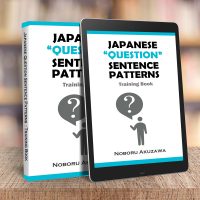Meaning: on the other hand
Formation:
Verb-casual + 反面
Noun + である反面
いadj + 反面
なadj + な/である反面
Phrase 1 + その反面 + Phrase 2
日本語 / にほんご / Japanese
(1) この薬はよく効く反面、副作用がある / 副作用があります。
(2) 彼の顔は怖そうに見える反面、彼の声は優しくおだやかだった / おだやかでした。
(3) この布は水に強い反面、熱には弱い / 弱いです。
(4) 彼はスポーツが上手な反面、勉強はまったくだめだ / まったくだめです。
(5) フェースブックは便利な反面、トラブルも多い / 多いです。
(6) 彼女のお兄さんは紳士である反面、子供っぽいところがある / 子供っぽいところがあります。
ことばと表現 / Words & Expressions
副作用【ふくさよう】 side effect
おだやかな【—】 calm
熱【ねつ】 heat
紳士【しんし】 gentleman
子供っぽい【こどもっぽい】 childish
英語 / えいご / English
(1) This medicine works well, but on the other hand, it has a side effect.
(2) In contrast to his frightening looks, his voice was kind and calm.
(3) This cloth is strong in water on the other hand, is vulnerable to heat.
(4) He’s good at sports, but on the other hand, he’s hopeless at studying.
(5) Facebook can be useful, but on the other hand, it also causes many troubles.
(6) Her older brother is a gentleman, but on the other hand, he’s also childish.
ひらがな / Hiragana
(1) このくすりは よく きく はんめん、ふくさようがある / ふくさようがあります。
(2) かれの かおは こわそうに みえる はんめん、かれの こえは やさしく おだやかだった / おだやかでした。
(3) このぬのはみずにつよいはんめん、ねつにはよわい / よわいです。
(4) かれはスポーツが じょうずな はんめん、べんきょうは まったく だめだ / まったくだめです。
(5) フェースブックは べんりな はんめん、トラブルも おおい / おおいです。
(6) かのじょの おにいさんは しんしである はんめん、こどもっぽいところがある / こどもっぽいところがあります。
ローマ字 / Roman letters
(1) Kono kusuri wa yoku kiku hanmen, fukusayō ga aru/ fukusayō ga arimasu.
(2) Kare no kao wa kowa-sō ni mieru hanmen, kare no koe wa yasashiku odayakadatta/ odayakadeshita.
(3) Kono nuno wa mizu ni tsuyoi hanmen, netsu ni wa yowai/ yowaidesu.
(4) Kare wa supōtsu ga jōzuna hanmen, benkyō wa mattaku dameda/ mattaku damedesu.
(5) Fēsubukku wa benrina hanmen, toraburu mo ōi/ ōidesu.
(6) Kanojo no onīsan wa shinshidearu hanmen, kodomo ppoi tokoro ga aru/ kodomo ppoi tokoro ga arimasu.


























No comments yet.